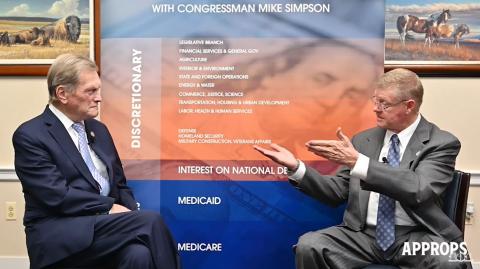Securing the Border: Inside the Homeland Security Appropriations Bill
Delivering on the constitutional duty of keeping Americans and the homeland safe are key themes of this week’s Appropriations 101 episode with Homeland Security Subcommittee Chairman Mark Amodei (R-NV), who delves into the core objectives of his FY25 Homeland Security bill.
While conversing with Interior and Environment Subcommittee Chairman Mike Simpson (R-ID), Amodei emphasizes his crucial decision to prioritize resources for the border and Secret Service by exceeding the levels requested by the Biden-Harris Administration.

Watch Subcommittee Chairman Simpson and Subcommittee Chairman Amodei’s conversation here.
Simpson: “[Chairman Amodei] was Chairman of the Legislative Branch Appropriations Subcommittee, which has its own issues, and he jumped from the frying pan into the fire because one of the more difficult bills for us to write is the Homeland Security bill. It deals with a lot of important agencies, and sometimes some controversial agencies.”
Amodei: “It's not TV material or anything like that - it's a lot of blue-collar work. You've got Border Patrol; you've got ICE; you've got the Secret Service; you've got the Coast Guard; and you've got FEMA. It’s just kind of an interesting hodgepodge of agencies that need a lot of attention, and a lot of work to try to get the policy right in terms of their funding… You have to get up and turn the crank every day and answer questions, because, as you know from your experience, [constituents often ask,] ‘How come you guys are spending so much money? So, you have to be light on your feet in terms of saying, ‘Well, comparatively speaking, and here's what they asked for, and here's what we gave them.’ But you know, this is one of the [bills] where what the Administration asked for in this last budget cycle, we ended up giving [Homeland Security agencies] more because we didn't think [the President’s Request] was enough, and we had to take from other agencies to do that. We don’t think this is a good time to be dialing back on the border or Homeland Security.”
Simpson: “Homeland Security is one of the more important bills that we deal with. They're all important, but it has more controversy in a variety of ways. Everybody has their own idea about what Homeland Security really means. The Department of Homeland Security was created after 9-11. We took a lot of different agencies and put them together because there was too much stove piping going on - we wanted them all in one agency. I think people are looking back now, [wondering if] we made the right decision with some of these things.”
Amodei: “I couldn't agree with you more that we should always go back and take a look to make sure this is the right thing to do – that has come up.”
…
Simpson: “I do think it's important to reexamine a lot of the decisions that we have made in the past. An example, on the Interior Subcommittee – and you sit on the Interior Subcommittee with me – is Indian Health Services. I've been talking to a lot of tribes, and a lot of them wonder if that's the best way to deliver health services to the tribes, or whether it would be better with direct appropriation. I don't know the answer to that, but I'm certainly willing to investigate it. That's what we should be doing to see if we can get a bigger bang for our buck in how we deliver some services.”
Amodei: “I'm with you on that. If somebody's got a better mousetrap, let's see how it works. I don't just assume that there's a better [decision] out there without taking that look you just described.”
###
